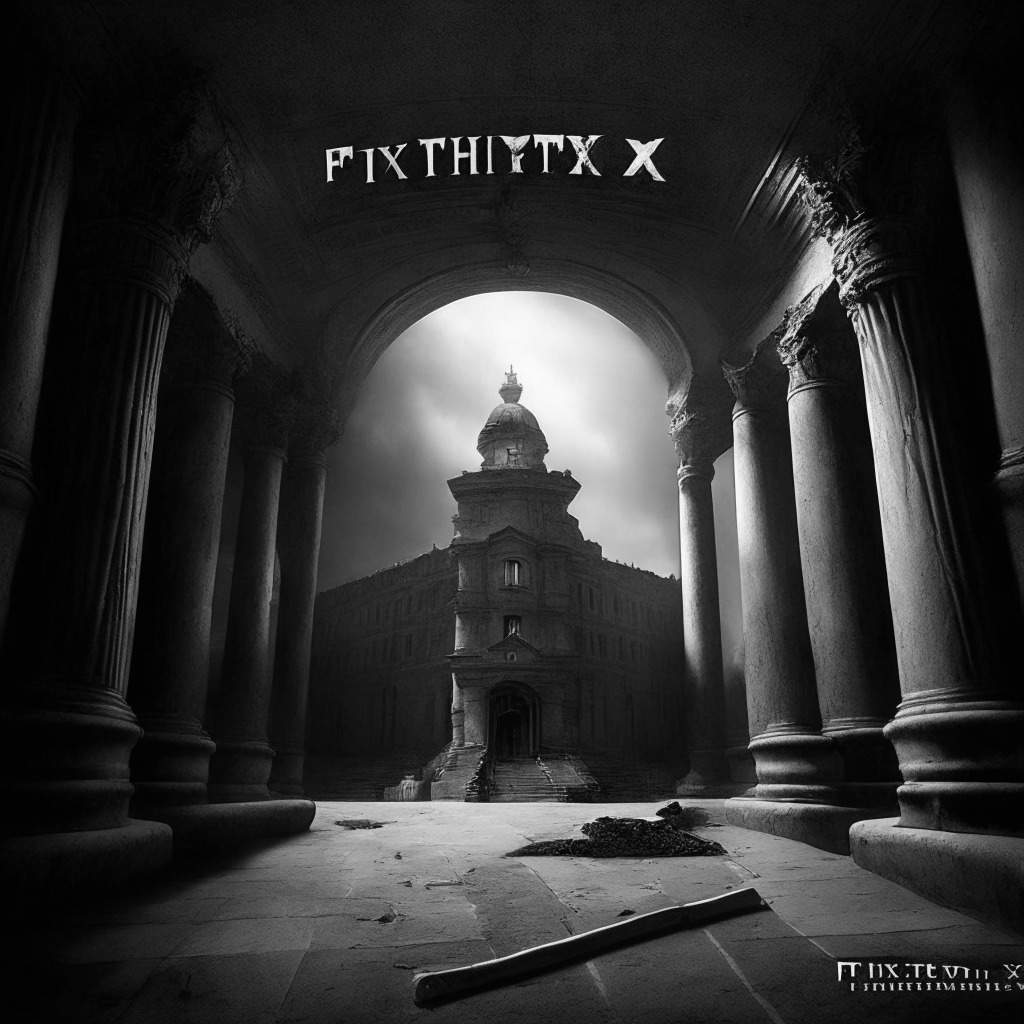“The Enforcement Division of the U.S. Commodity Futures Trading Commission (CFTC) may charge ex-CEO of Voyager, Stephen Ehrlich, over a suspected ICO scam. Ehrlich allegedly violated CFTC regulations by not ensuring their customers’ assets’ security. The CFTC is contemplating imposing fines and other non-criminal penalties.”
Search Results for: crypto industry
Layoffs at Ledger and Beyond: Reflecting on Job Cuts in the Crypto Industry Amid Market Uncertainty
Ledger, a hardware crypto wallet manufacturer, has announced plans to lay off 12% of its workforce, equating to about 88 job losses. CEO Pascal Gauthier attributed this decision to a challenging macroeconomic environment and to ensure business longevity.
Decentralized Social Media: Friend.tech’s Soaring Success Amid Crypto Industry’s Security Chaotic Quarter
“Decentralized social media platform, Friend.tech has surpassed 10,000 ETH in revenue and 30,000 ETH total value locked (TVL). Despite early criticisms questioning its longevity and revenue model, the platform’s continuous growth asserts its increasing appeal. However, digital asset security remains a concern, with Q3 2023 losses nearing $700 million due to securities incidents.”
Zumo’s Compliance with FCA Guidelines: Signifying Innovation and Commitment in Crypto Industry
Zumo, a digital asset-as-a-service platform, became the first cryptocurrency company to incorporate the Financial Conduct Authority’s new financial promotions technical flow guidelines. These rules aim to protect consumers investing in cryptocurrencies. Zumo’s adherence signifies commitment to regulation, user protection, and industry integrity.
Navigating Regulatory Maelstrom: Coinbase’s Legal Disputes and the Future of Crypto Industry
Despite ongoing legal disputes with the SEC, Coinbase’s Chief Legal Officer, Paul Grewal, views these as potential shapers of the crypto industry’s future. He interprets these challenges as against the entire digital assets and crypto space rather than just Coinbase. He hopes recent judgments could illuminate the SEC’s overreach, and emphasizes the need for regulation clarity. Amid the disputes, Coinbase seeks to change US crypto legislation, highlighting the crucial importance of clear cryptocurrency regulations.
Government Lens on AI: Lessons from the Crypto Industry’s Regulatory Travels
“John Rizzo suggests the AI sector should anticipate forthcoming scrutiny, much like cryptocurrencies. AI can learn from crypto’s challenges. While crypto tried to integrate into the highly regulated financial sector, AI targets multiple sectors, presenting a larger challenge.”
Navigating the Future: Exploring Recent Advances and Challenges in Blockchain and Crypto Industry
“BNB Chain developers launched opBNB’s mainnet, aiming to address blockchain’s congestion and high transaction costs. Nansen presented an AI-powered upgrade of its platform to track suspicious trades and monitor transfers. Ripple plans to hire internationally due to regulatory dissatisfaction. Telegram and TON Foundation announced a self-custodial crypto wallet, TON Space, while Opera launched a non-custodial stablecoin wallet in Africa.”
Ripple Migration: A Wake-Up Call on Regulatory Clarity in the Crypto Industry
Ripple CEO Brad Garlinghouse revealed that 80% of the company’s recruitments in 2021 will be in nations with clear regulatory landscapes like Singapore, Hong Kong, U.K., and Dubai, due to the ongoing legal frost with the U.S. SEC. This underscores how uncertain regulations can impact global industry growth.
Navigating Through Binance Exodus, Nasdaq’s AI, and Crypto Industry Legal Drama: What’s Next?
“Binance continues to lose key figures amid regulatory woes, sparking questions about its future, despite CEO assurances. Nasdaq’s first AI-driven order type has SEC approval, signaling a significant technological shift in trading. The crypto industry wrestles with legal issues and regulation debates, highlighting a resilient sector skilled at innovation amid regulatory challenges.”
SEC Crackdown vs Blockchain Evolution: LBRY’s Legal Tussle and Its Impacts on Crypto Industry
LBRY blockchain firm, initially ceding to the SEC’s ruling that it operated unregistered crypto asset securities, has filed an appeal. This verdict and ongoing regulatory friction highlight challenges in balancing innovation encouragement with investor protection in the emerging blockchain field.
Ripple’s Regulatory Rollercoaster: A Beacon of Hope for the Crypto Industry?
“The Ripple CTO expressed optimism about the U.S. regulatory landscape, citing the court ruling that dismissed the classification of Ripple’s XRP as a security. This decision denotes a potential shift away from the rigorous scrutiny that the cryptocurrency industry faced. Despite previous reluctance, judges are showing skepticism towards SEC cases, which may benefit the industry via prompted legislative changes. These legal triumphs mark potential shifts in the regulatory arena, offering hope to industry participants.”
Financial Misconduct Scandal at Crypto Exchange FTX: Ripple Effect on the Crypto Industry
“Recent filings at the United States Bankruptcy Court indicate financial irregularities at crypto exchange FTX. Documents suggest misuse of company funds by executives, with transactions aimed to enrich the top brass at FTX and Alameda Research.”
Grayscale Court Victory: A Landmark for US Crypto Industry or SEC Overreach?
Republican Presidential candidate Vivek Ramaswamy perceives Grayscale Investments’ recent courtroom victory over the SEC as a critical defense for blockchain and Bitcoin innovation in the U.S. He plans to rollback federal regulations that hinder the growth of crypto markets if they don’t meet Supreme Court tests, while criticizing the contentious approach of regulation by enforcement preferred by the SEC.
Spot Bitcoin ETFs: A Challenge for the SEC and a Leap for Crypto Industry
“The triumph of Grayscale, a digital currency asset manager, could increase the possibility of the SEC approving spot bitcoin ETF applications. This has enormous implications for the crypto industry, opening the floodgates for more institutional investors into the market without needing to acquire underlying digital assets.”
Tether’s New Link with Bahamas-Based Britannia Bank: A Boon or Bane for the Crypto Industry?
Tether, the issuer of popular stablecoin USDT, has established banking relations with Britannia Bank & Trust. This connection could streamline dollar transfers, improving Tether’s functioning within the traditional financial network. Britannia’s recent acquisitions and positive stance on crypto suggest this relationship is strategic for both entities, impacting the future of the crypto industry.
Federal Court Ruling on Bitcoin ETFs: A Setback for SEC or Forward Leap for Crypto Industry?
The U.S. Securities and Exchange Commission (SEC) must reconsider its stance on bitcoin spot ETFs following a court victory by Grayscale Investments. The SEC has four options, but the course of action it takes could set a precedent for future crypto projects. It’s crucial that the SEC finds a balance between embracing cryptocurrency and ensuring investor protections, without stifling innovation.
Grayscale’s Victory: A Mixed Blessing for the Crypto Industry? Unraveling the Consequences
The District of Columbia Circuit Court of Appeals overturned the SEC’s rejection of Grayscale Investments’ Bitcoin spot ETF application, a victory that many crypto enthusiasts celebrated. However, this decision could invite substantial ‘Big Money’ to the crypto table, introduce new challenges, and potentially incite backlash from SEC. It’s suggested to stay prepared for the uncertain future of crypto regulations.
Intricacies of Sam Bankman-Fried’s Case: Crypto Industry’s Legal and Technological Conundrum
Former FTX CEO, Sam Bankman-Fried finds himself involved in a legal battle, contesting evidence included in a lawsuit against him. Key to the case is access to and the integrity of documents in Bankman-Fried’s Google account, raising questions about the use of personal accounts as potential evidence. This case underscores the need for clearer boundaries and stricter regulations in the crypto industry’s use of digital tools and platforms.
Urgent Anticipation: SEC Verdict on Major Bitcoin ETF Applications and the Crypto Industry’s Future
The U.S. SEC’s impending response to Bitcoin ETF applications from top financial firms like BlackRock, VanEck, Invesco, Bitwise, and WisdomTree represents a crucial phase in integrating cryptocurrencies with conventional financial markets. The SEC’s decision could indicate some significant implications for the crypto industry’s future.
Evolving Regulation & Legal Proceedings: A Tug of War in the Crypto Industry
“The U.S. Securities and Exchange Commission (SEC) is in a legal tussle with Ripple Labs and crypto exchange Gemini over regulatory laws and digital assets. The outcomes of these cases could significantly shape future blockchain-related lawsuits, highlighting the need for a clearer, adaptable legal framework for digital assets.”
Coinbase Achives Unprecedented U.S. Regulatory Milestone: Boom or Bust for Crypto Industry?
The U.S. Commodity Futures Trading Commission (CFTC) has granted Coinbase unprecedented authority to handle bitcoin and ether futures, marking it as the first crypto company to receive registration as a futures commission merchant. This significant development indicates robust systems for capital, disclosures, record-keeping, and customer fund segregation, and it might influence how ether and similar commodities navigate the U.S. regulatory regime. However, concerns arise about potential market manipulation and the impact on other crypto-native companies.
Prime Trust’s Bankruptcy: Crisis or Catalyst for the Emerging Crypto Industry?
Prime Trust, a major custodian of digital assets, has filed for Chapter 11 bankruptcy due to a deficit in customer funds. This raises questions about financial risks in the largely unregulated cryptocurrency landscape and emphasizes the need for stronger regulation.
The Downfall of FTX: A Tipping Point for Crypto Industry’s Fragility and Future
The former CEO of FTX, Sam Bankman-Fried, faces potential incarceration amid allegations of witness tampering in a case concerning a massive $3 billion defrauding of customers and investors. His situation has shaken public faith in the crypto industry and prompted tightened regulations.
Emergence of Regulated Crypto Exchanges: Boon or Bane for the Crypto Industry?
“Blockchain.com has been granted a major payment institution license by the Monetary Authority of Singapore, permitting it to offer regulated digital payment token services to international clients. This reflects Singapore’s ongoing support for crypto companies, contributing to discussions about the impact of increasing regulatory controls on crypto’s foundational values and innovation.”
Hong Kong’s Ambition to Lead the Crypto Industry: Harmony or Collision with China’s Ban?
“Hong Kong is striving to become a leading crypto hub, aiming to integrate its virtual asset platforms with Shanghai’s. As part of this development, they’ve established a robust regulatory framework for cryptocurrency exchanges, fostering an environment of diverse investment opportunities. This shift poses a likely harmonization between China’s cautious approach and Hong Kong’s liberal views on blockchain technology.”
Figure Technologies Stumbles in Quest for Federal Bank Charter: A Tale of Regulatory Hurdles and Crypto Industry Prognosis
“Figure Technologies, after a challenging three-year process marked by regulatory scrutiny, has withdrawn its application to become a federally chartered bank in the U.S. The hindrance emerges amidst an uncertain banking landscape for digital asset companies and post the downfall of some related regional lenders.”
Binance Facing Fraud Charges: Potential Ripple Effects on Crypto Industry
Popular crypto exchange Binance could potentially face fraud charges by the U.S. Department of Justice, according to CoinDesk. Legal alternatives such as fines and deferred or non-prosecution agreements are being considered due to potential industry-wide implications.
Bankruptcy Battle: FTX’s Controversial Plan for Creditors and Its Impact on Crypto Industry
“The new FTX management proposes a novel approach to handle creditors’ claims following the crypto exchange’s bankruptcy, stirring varying sentiments. This includes differentiation of creditors and excluding FTX’s exchange token holders from any distributions. These decisions, deemed a possible detriment to industry principles, have sparked criticism from the Unsecured Creditors Committee and FTX 2.0 Coalition.”
Controversy Unmasked: The Disputed Origin of MetaMask and the Crypto Industry Implications
Joel Dietz, entrepreneur and alleged originator of MetaMask, is taking his battle to court against ConsenSys, Ethereum’s developer firm. He claims to have conceptualized the in-browser crypto wallet blueprint that gave birth to MetaMask, but was later unjustifiably erased from its history.
Sam Bankman-Fried’s Legal Tug-of-War: Increasing Regulatory Pressures on Crypto Industry
“Sam Bankman-Fried, founder of crypto trading platform FTX, is embroiled in legal battles, with accusations weakened by a “thin” factual foundation. Bankman-Fried faces seven charges, including securities and wire fraud. The trials shed light on the regulatory pressures impacting the crypto industry.”
Venture Capital Boom in the Crypto Industry Amidst its Chilled Winter
“Last week observed a striking $201.4 million venture capital infusion into digital currency firms, exemplifying the resilience of crypto industry despite challenges. Investments focused on innovative technologies such as zero-knowledge proofs. However, the volatility marked by tokens like RDNT reminds of the persistent risks.”
Coinbase Staking Services Halted: An Ongoing Battle with the SEC & Its Potential Impact on the Crypto Industry
Coinbase, US-based cryptocurrency exchange, has temporarily halted staking services in four US states following SEC’s lawsuit accusing them of selling unregistered securities. Amid regulatory scrutiny, Coinbase argues that their staking services aren’t securities, challenging established legal protocols and definitions of investment contracts.






























